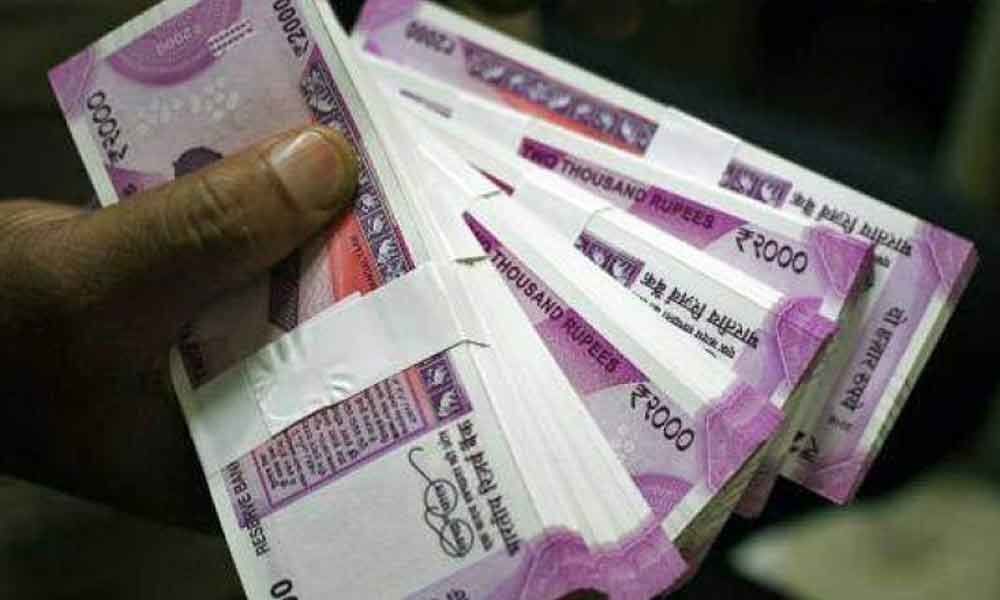Big cash withdrawal may attract tax

FM mulling 3% to 5% tax on cash withdrawal of Rs 10 lakh a year
New Delhi : Withdrawing a cumulative Rs 10 lakh a year can attract 3-5 per cent tax if a proposal going around in the Finance Ministry takes shape in the Budget to track high value cash deals and make digital payments mandatory.
In its push towards a digital economy, the central government is thinking of introducing a tax of 3-5 per cent on cash withdrawal of Rs 10 lakh in a year, a move to discourage cash usage in the economy and resultant black money.
Paying Rs 30,000-Rs 50,000 for Rs 10 lakh annual withdrawal will be seen as a loss, the government thinks and feels this will discourage large cash transactions.
Official sources said discussions have been held internally on the fallout of such a move and the tax figure is still being discussed though it won't be less than 5 per cent, said sources adding 3-5 per cent is an appropriate figure.
As a step towards this, earlier this week, the Reserve Bank of India waived the fee currently imposed on banks for using its NEFT/RTGS payment servers.
The central government also said it was setting up a panel to review charges imposed by banks on ATM withdrawals. RBI said it was doing so to boost digital transactions.
Another source was quoted as saying, "Why should someone withdraw over Rs 10 lakh for cash transactions when digital payments are being encouraged?". It may be noted that just last week, RBI scrapped NEFT and RTGS transfer charges and the central bank is also reviewing the charges on cards as well.
The proposal is at a discussion level but has found favour for being a step towards a digital economy and tracking transactions. Sources said this is a global practice. Even in Pakistan a withdrawal of more than Rs 50,000 attracts such a tax.
During 2005-2008, the UPA government imposed tax on withdrawals of more than Rs 50,000 from current accounts for detection of unaccounted money in the absence of alternative methods. This tax was applicable only on cash and not on payment by cheques.
During 2015, when the Greek economy was on the verge of bankruptcy, millions of panicked citizens completely cleared their accounts by pulling more than 28 billion euros out of banks and pushing the total cash revenue held in the country's financial institutions to a 10-year low.
A high-level committee on digital payments in 2017, headed by Chandrababu Naidu, the then Chief Minister of Andhra Pradesh, had suggested a tax to discourage cash transactions, a cap on the maximum allowable limit for large-size cash transactions and a complete abolition of charges on card payments to incentivise digital transactions.
The committee had submitted the report to Prime Minister Narendra Modi. It had suggested "considering levy of banking cash transaction tax (BCTT) on transactions of Rs 50,000 and above."
To combat this Greek banks proposed taxing cash withdrawals and requiring use of debit and credit cards for all transactions in order to prevent tax evasion. A surcharge for all cashpoint withdrawals was introduced approximately amounting to 1 euro for every 1,000-euro transaction.
It was expected that it would not impact day-to-day withdrawals and will deter citizens from clearing out their bank accounts.
The Finance Act 2017 prescribed imposing a penalty equal to the transacted amount on those who violated the rule restricting cash transactions. It provides that no one can deal in cash in excess of Rs 2 lakh in a single day, in respect of a single transaction or transactions relating to one event or occasion barring a banking company, post office savings bank and cooperative bank.
To curb large cash transactions and discourage black economy, then Finance Minister Arun Jaitley had in the 2017-18 budget proposed to ban transactions of over Rs 3 lakh a day.
This limit was lowered to Rs 2 lakh through an amendment to the Finance Bill 2017 that was later passed by Parliament.
In another related measure, the Finance Act said any capital expenditure in cash exceeding Rs 10,000 shall not be eligible for claiming depreciation allowance or investment-linked deduction. Similarly, the limit for revenue expenditure in cash has been cut to Rs 10,000 from Rs 20,000.

















